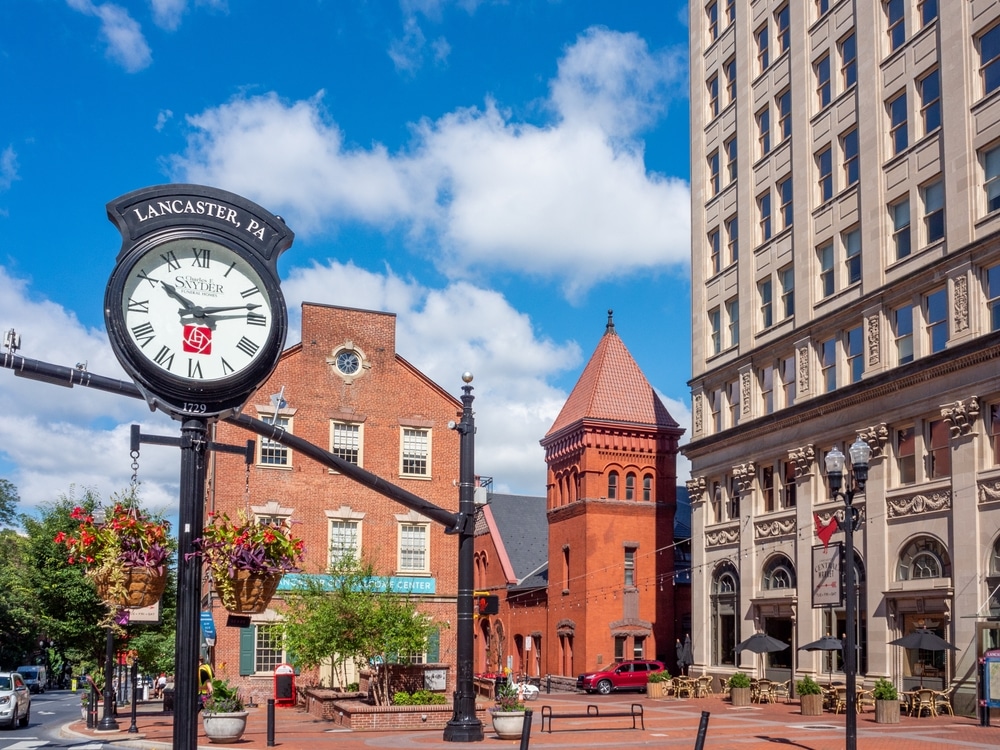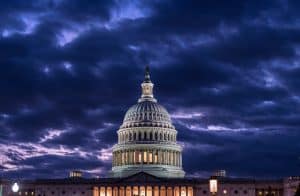When local activist Frank Arcoleo found out over the summer that a data center was coming to his neighborhood in Lancaster, Pennsylvania, he said he was furious. There’d been no votes or public hearings.
The first phase of the data center project under development there only required administrative approval from a few city officials, based on the building permit application and state laws.
“So these data centers are going in, and guess what? The public gets nothing to say about it because the city’s already approved it,” Arcoleo said.
Now, Arcoleo is backing a zoning ordinance under consideration by the Lancaster City Council that aims to ensure residents have a say in the future. The ordinance would require data center projects to undergo a special exception hearing from the city’s zoning hearing board. It would also require data centers to adhere to the city’s noise ordinance and for developers to submit a report detailing the project’s planned electricity and water use for the city to review.
Similar efforts are underway across the country, as municipalities move quickly to enact ordinances about where and how data centers are built. A few communities have turned to ballot measures or lawsuits.
But at the same time, some state lawmakers are rushing to pass legislation that would accelerate the development of data center infrastructure.
READ: Not Everyone Is Sold on the Benefits of Amazon’s Data Center Coming to Falls Township
More data centers are being built nationwide to meet the demand for digital services, including power-hungry artificial intelligence systems. Data centers, which house thousands of servers, are able to store and transmit the data required for internet services to work.
The facilities support a digital society and can provide increased tax revenue. Data center advocates argue they also can bring new jobs and other benefits for states and local communities. But residents and local leaders in several localities across the country — including cities in Delaware, Georgia, Kentucky, Michigan, Mississippi, New Mexico, Tennessee, Virginia and other states — are concerned about how the facilities could drive up utility bills and harm the environment.
Lancaster’s residents, including Arcoleo, are worried about the amount of energy required to power data centers — which could drive up electricity rates for the entire city, he said.
“Data centers alone will cause dirty electricity sources — coal-fired plants, diesel-fired plants, natural gas-fired plants — that were due to come offline to stay online because we need every kilowatt of power that exists,” said Arcoleo, a member of the progressive advocacy group Lancaster Stands Up. “That affects me too because it ruins my environment.”
But Pennsylvania’s governor has been working to bring more data centers to the state. In June, Democratic Gov. Josh Shapiro announced that Amazon was planning to invest at least $20 billion to build data center campuses across Pennsylvania — the largest private sector investment in state history. He’s also pushing proposals to encourage more energy production in the state, which would supply data centers. But critics say parts of his plan would sideline local officials.
‘This is moving so quickly’
Data centers require a great deal of electricity to run, which some state officials worry will drive up electricity demand — and utility bills.
Many data centers also require significant amounts of water to cool their servers. Large data centers can consume up to 5 million gallons of water per day — equivalent to the water use of a town of 10,000 to 50,000 people, according to a report from the Environmental and Energy Study Institute, a nonprofit that provides educational resources to policymakers and the public.
Local leaders and advocates across the country are weighing the potential outcomes in their community. In August, Starwood Digital Ventures submitted plans to New Castle County, Delaware, for a data center project that could consume as much power as 875,000 to almost 1 million homes — nearly twice the 449,000 housing units that exist in the state, according to Spotlight Delaware.
The proposed data center sparked strong opposition from residents at a July town hall, including state House Speaker Melissa Minor-Brown, a Democrat, who organized the event. New Castle County Councilman David Carter was already working on an ordinance that would put up guardrails for data center development in the area.
Under the proposed ordinance, data centers could not be built within 1,000 feet of any residential zoning district. Developers would also be required to coordinate with state regulators to ensure enough water is available to cool the facility’s servers. The ordinance also outlines a decommissioning process for data centers that are no longer in use.
“Most of these concerns are things you can manage and plan for, but this is moving so quickly that I think across the country, most jurisdictions are playing catch-up for their codes to best manage these data centers,” Carter told Stateline.
Currently, Virginia leads the country in data center development. In the absence of state laws, Virginia’s localities began to make their own data center rules.
Earlier this year, local leaders in Loudoun County, Virginia, which has one of the highest concentrations of data centers in the world, amended the county’s zoning ordinance to require data center proposals to go through a public hearing process and get approval from the Board of Supervisors.
“Things like this [data centers] are never designed to benefit communities and working people. They’re only designed to exploit communities and enrich stakeholders and rich people.” – Josh Nice, Lancaster
Loudoun County officials are looking forward to new data center bills coming out of next year’s legislative session, said Michael Turner, vice chair of the Board of Supervisors. But he added that decisions regarding data center development should ultimately be left to localities.
“The decision for how local communities can use their land has to be left to the local communities,” Turner said. “But there’s no question: There’s rising tension between local community government, and state and federal government, as this high demand for both data and energy is continually rising.”
Meanwhile, Virginia Republican Gov. Glenn Youngkin vetoed a bill in May that would have required data center developers and energy utilities to disclose information to local governments on noise and environmental impacts of a proposed project.
In DeKalb County, Georgia, in October, county leaders voted to extend a local moratorium on new data center applications until Dec. 16 while local leaders assess the impact of the incoming facilities, according to Decaturish. At the same time, county leadership is considering a zoning amendment that would regulate where data centers can be built, how they are designed and other standards.
Local advocates in other areas of the country are pursuing change through the ballot box or lawsuits. Residents in Augusta Charter Township, Michigan, collected enough signatures for a referendum that would let voters decide on rezoning for a proposed data center. Township leaders believe the new facility will generate tax revenue for the community, but residents are concerned about noise and light pollution and higher electric rates, according to Inside Climate News.
In Doña Ana County, New Mexico, residents and an environmental law group filed two lawsuits that allege county commissioners violated state law by approving a data center project that had an incomplete application. Local advocates and state lawmakers representing the county say the developers’ plan to build a natural gas generating station for the data center would exploit a loophole in a state law that requires utilities to use fully renewable energy resources by 2045, according to Source New Mexico.
Still, some local leaders welcome data centers in their area. In September, AVAIO Digital, a Connecticut-based data center developer, announced that it had broken ground on a $6 billion data center campus in Brandon, Mississippi, about 15 minutes outside of Jackson.
Shortly after the data center was announced, several concerned residents in Rankin County began a petition demanding that county representatives address concerns about utility bills and pollution.
But Brandon Republican Mayor Butch Lee said he sees the project as an opportunity. As more data centers are built, it will prompt more areas to expand and modernize their electrical grid, he said. Local leaders are also working to ensure that the data center uses recycled water for cooling its systems in an effort to promote conservation practices, he said.
“I don’t see any environmental problems,” Lee said. “I don’t see any water problems. I just see a changing national and global landscape of what the next 100 years is going to be like.”
And John Malone, a principal at AVAIO Digital, said the company wants to commit itself to being good neighbors.
“All of these things work better when you’re good neighbors. And so we get it — this is a big project coming into your community,” Malone said. “Of course, people are going to have questions.”
Pennsylvania pushes
Lancaster’s residents are not alone. Local leaders in two Pennsylvania townships, East Vincent and North Middleton, are considering similar rules that would restrict where data centers can be built and operated.
They would establish a special zoning designation for data centers and require developers to study how the structures could affect the local environment, water supply, traffic patterns and more.
And a new zoning ordinance adopted by West Pennsboro Township in August requires those studies and confirmation from developers that an electricity supplier in the area will be able to supply enough power for a data center to serve new data centers in the area.
In Pennsylvania, developers are advertising data centers as an economic opportunity for the state’s local communities, said Livia Garofalo, a researcher with Data & Society’s Trustworthy Infrastructures team. The nonprofit research institute studies the social implications of data-centric technologies.
READ: Pennsylvania Community Groups Urge Officials to Restrict Data Center Development
She said that while some local leaders welcome the potential revenue, others are wary of the major changes data centers have brought to other communities like theirs. A lot of Pennsylvania towns have witnessed the rise and fall of other industries — such as steel and coal — that were said to be good opportunities. Now, they must decide if the data center industry is worth it.
“For some of these communities who are experiencing economic difficulty — especially with a federal shutdown — some of these townships are saying, ‘Well, why not?’” Garofalo said.
Lancaster residents are still trying to understand what the new data center means for the city.
But for Josh Nice, who lives in the city’s Stadium District neighborhood, there’s an “anticipatory grief” — the feeling of worry that comes with an impending loss or change.
“Things like this [data centers] are never designed to benefit communities and working people,” said Nice. “They’re only designed to exploit communities and enrich stakeholders and rich people.”
In Virginia, Turner said he hopes that local communities can work alongside state officials and the federal government in the future to make decisions together.
“All the counties are very concerned about the federal government or the state making broad brush decisions about local land use that can really negatively — and, I mean, negatively — affect local communities,” Turner said.
Stateline, where this article was originally published, is part of States Newsroom, a nonprofit news network supported by grants and a coalition of donors as a 501c(3) public charity. Stateline maintains editorial independence.






